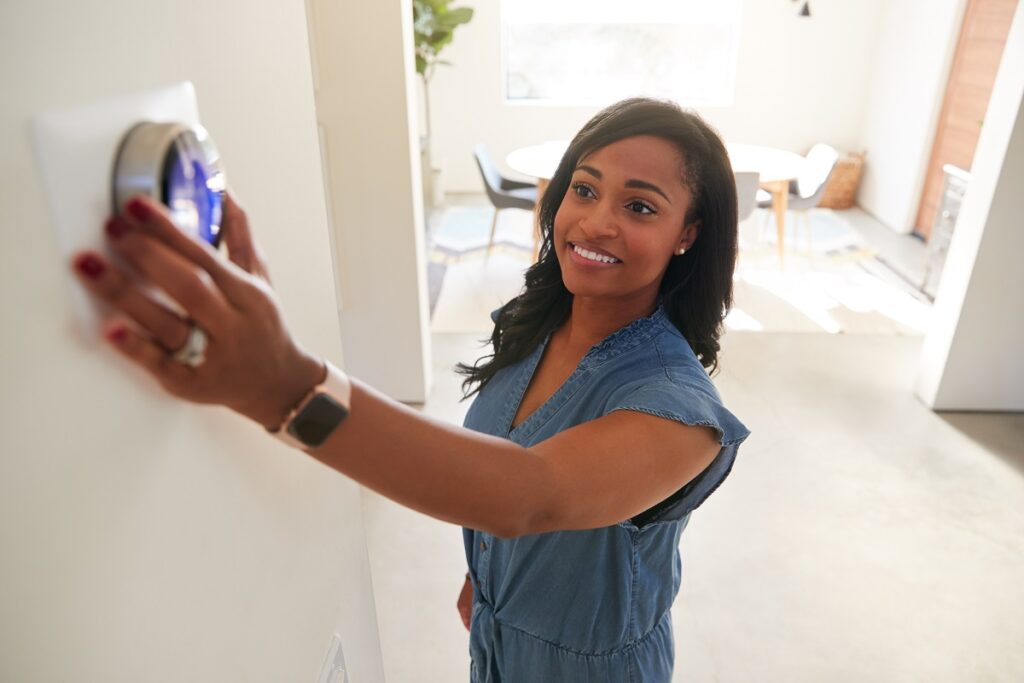Moving into a new home is exciting, but what do you do first? After unpacking your worldly possessions and setting up your Wi-Fi, here is a quick homeowner to-do list to check off the first year in your new home!
1. Upgrade your home security
You never know to whom the previous owner gave a key to the house. (Unfortunately, they may not remember either!) That’s why it’s imperative to change out the exterior locks immediately and consider installing a video doorbell! This device will notify you when neighbors come to welcome you to the neighborhood.
You may also want to add a few more smart home tech devices, such as motion-detection lights and cameras, and a smart lock! Also, don’t forget to check all the window locks. If you notice any of these are broken, get them fixed pronto. You never know how or why the lock broke, and we’ve all heard about The Watcher.
2. Complete routine home maintenance

If the previous owner didn’t keep a record of their home maintenance tasks in vipHomeLink, then there’s a good chance you don’t know when the last time the HVAC air filters were replaced. You probably don’t know when the last time the plumbing fixtures were checked for leaks or when the roof was repaired. You might even be in the dark about the last time they changed their light bulbs.
The best thing you can do to make sure your home and family are safe is to complete routine annual home maintenance tasks, including getting your HVAC serviced. The vipHome.app can help with tailored recommendations and personalized reminders! Download the app today to enjoy a simplified homeownership experience!
3. Plan for the future
You just made an extremely large purchase, perhaps the biggest you’ll ever make, but many homeowners, especially first-time home buyers, forget to put aside money for repairs. These costs can add up quickly.
We recommend saving 1%-4% of the purchase price of your home annually but check your home cheat sheet – also known as the home inspection report – to see if you should be saving a bit more for big upcoming repairs, like a new roof.
4. Do an extreme clean
If your new home is a new-to-you home, a lot of life has happened on those carpets and in that house that you don’t even know. Steam-cleaning carpets can help get rid of pet hair, smoke, spills, and stains. Doing a deep clean, whether you tackle the challenge yourself or hire a professional, allows you to start off on the cleanest and most hygienic foot.
You should also make sure to clean any appliances that were left by the sellers. While you might know where these have been, you don’t know what has been in them.
5. Find your boxes and valves

Believe me, finding a circuit breaker for the first time when the lights go out is not a fun experience. Instead, find your break box as soon as you’re in your new home and ensure that it’s labeled properly. If not, call a licensed professional to help light up your world and keep it that way.
Also, don’t forget to find your water shut-off valve, which can shut off the water coming into your home if you have a major leak. If you have gas in your home, you should also locate that shut-off. That’s extremely important for people in areas prone to earthquakes.
6. Test the waters
Leaks and plumbing issues can cause lots of damage very quickly. Listen for any running toilets, dripping water, or visible signs of water damage. To be on the safe side, you might want to hire a licensed plumber to do an inspection and ensure your plumbing system is working properly.
Don’t forget to test your tap water, too! Even if you have municipal water, your tap water can have contaminants, and if you have well water, you can find anything from arsenic to emerging PFAS chemicals in it.
7. Install a fire prevention starter pack

Before you spend your first night in your home, you should test all your detectors to make sure they’re in proper working order and positioned correctly. Smoke detectors should be in each bedroom, outside each sleeping area, and on every level of your home, including the basement. Make sure you have at least one carbon monoxide detector on each floor.
Also, don’t forget to create a new evacuation plan for your new home and test it with the entire family twice a year. This simple step can save your life.
8. Be ready for emergencies
We don’t like to think of worst-case scenarios, but it’s important to be prepared for them. Have a small first-aid kit, flashlights, potable water, blankets, the first season of Ted Lasso downloaded onto your phone — anything that would help you in an emergency. Also, don’t forget to prepare your appliances for stormy weather, as PSE&G shared with us!
9. Embrace your energy-efficient side

New homes can also come with a lot of expenses. One simple way to save a bit of money is through energy efficiency. Simply using LED light bulbs instead of incandescent light bulbs can save a household up to $225 in energy costs per year!
Programmable thermostats (especially smart thermostats) can help you score significant savings on your heating and cooling bills, and if you’re getting new appliances for your new home, make sure to choose ENERGY-STAR models. These can save your household up to $450 on your yearly energy costs!
10. Use a home management app
Homeownership can be hard, but it doesn’t have to be. vipHome.app was designed for busy homeowners who want to save time and money while increasing their home’s value and safety.
Prepare your home to help prevent damage and keep your family safe with our property-specific weather notifications. Use the app to start a home inventory as you unpack, store all your important home documents, and keep track of your maintenance in the home log.
In less than four minutes, enjoy a new way to manage your home. Download the app today!







